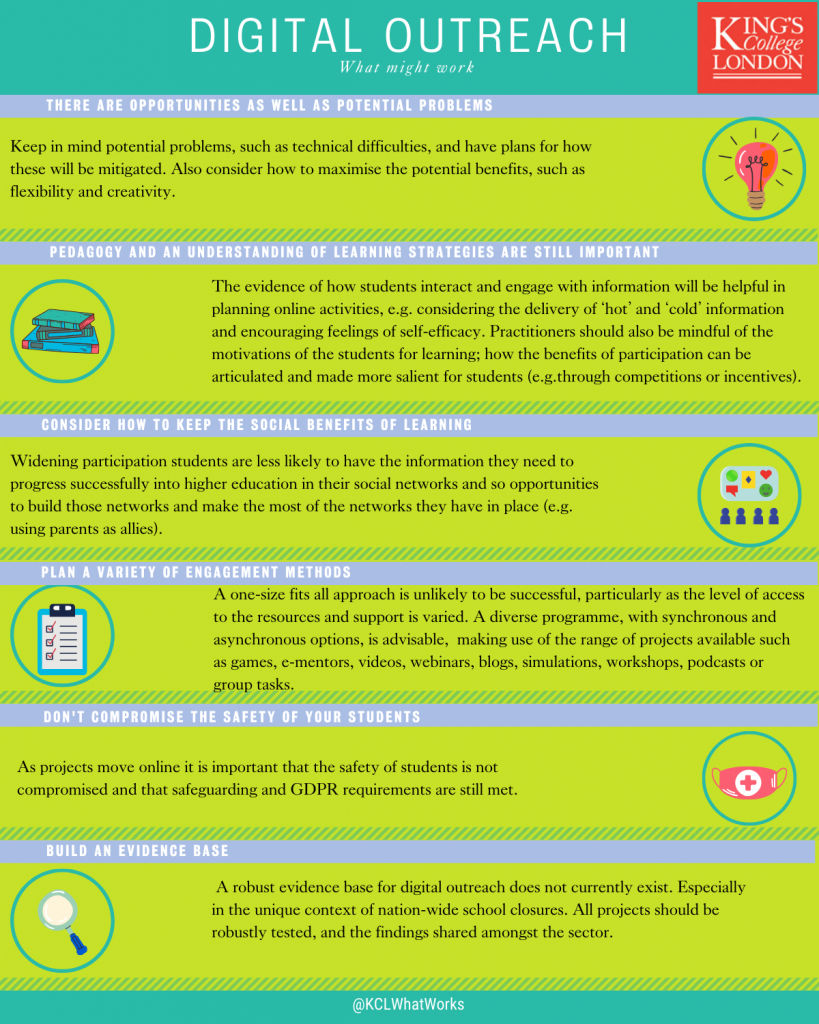
Vanessa Todman, Head of Student Experience Research |
When approached about how to run social research during lockdown, often our advice is ‘don’t do it’. However, that isn’t always possible. One area where evidence is urgently needed is moving widening participation activities online.
This is both an interesting and frustrating time to be in university research and evaluation. Evaluation practices haven’t stopped, in fact they are more important than ever, and we are working hard to help practitioners in KCLWP to update all our Research Protocols to reflect the move online. We’re also finding we are being called upon to give advice to teams who are unsure how to use and obtain evidence in the current climate. This is a unique (hopefully) set of circumstances. Care should be taken when interpreting data; both suggesting that because something works now it will work later and suggesting that evidence that applied before the government lockdown will generally apply now.
This isn’t a time to build our general evidence base
As Michael Sanders noted in his recent blog, we must resist the urge to see this as a ‘cool’ time to test out our new ways of working. Any findings will only apply in this specific context, which we hope won’t be replicated again. Similarly, any survey of students will be coloured by the current circumstances. Even in surveys which take into account the Covid-19 crisis, care must be taken, as Jim Dickinson has recently pointed out for WonkHE. In particular, we are poor estimators of our own behaviour at the best of times, so, for example, asking students what they think they’re going to do in September when none of us know right now what September will look like, isn’t going to get you even close to reliable results.
But as we move online we need to be testing, learning and adapting
One of the big tasks we’re currently working on in King’s is how we move our widening participation activities online. There isn’t a big evidence-base for this, but there are pockets of useful information. For example, the EEF has evidence of the positive effects of involving parents in learning, which could be applicable now, with the caveat that the evidence applies to a time when schools were also open. They highlight the importance of working with parents[i], and have a free newsletter on the subject, as well as infographics[ii], and videos[iii] to help parents during lockdown.
Based on findings such as these from our internal rapid evidence review, below are the principles that we are currently working with internally:
We need to use our understanding of how children learn and test it in the current situation
We know a lot about how young people learn, and those principles shouldn’t be lost as we move online. For example:
- How students respond to hot (experiential) and cold (facts)[iv] information, how that influences the weight they give to information from different sources.
- The importance of building perceptions of self-efficacy with short-term goals[v] and meaningful feedback [vi].
- The need to make it clear why students are performing educational tasks[vii].
- The use of incentives in encouraging action in children.
- The significance of social networks (see our blog), and
- the utility of engaging “System two” processes (explained in our previous blog), through activities such as group activities, problem-based learning and games.
We are using research such as this as indicators of things to try, with the caveat that projects should be robustly evaluated. Practices that are found to work should then be built on and adapted and practices that are not found to work stopped, and new things tried.
We need to build an evidence base for digital outreach
What is most essential is that there is an open dialogue within the sector. Evidence should be shared, so that resources are appropriately targeted. We don’t know how long this will go on for, and so it is important that we begin to build an evidence base. Useful reports are already emerging. With the Sutton Trust reporting variation in the ability of schools to deliver online classes[ix], and the Centre for Education Policy and Equal Opportunities at UCL[x] finding variation in the amount of home-schooling taking place, we know there are gaps that need to be filled by university WP teams. There are also many useful documents out there to suggest how to do it, such as the Brilliant Club’s guide for promoting digital inclusion[xi] and the EEF’s report on the best evidence for supporting students to work remotely[xii]. There is also guidance on how to keep children safe online by the NSPCC [xiii] and NEON are hosting regular best practice events[xiv].
Please share around anything else you find that others may be able to use.
_______________________________________________________________________
Click here to join our mailing list.
Follow us on Twitter: @KCLWhatWorks
[i] https://educationendowmentfoundation.org.uk/projects-and-evaluation/projects/texting-parents/
[ii] https://educationendowmentfoundation.org.uk/public/files/Publications/Covid-19_Resources/Resources_for_schools/Talk_with_TRUST_infographic.pdf?mc_cid=7dede45ca9&mc_eid=edcac8c4a1
[iii] https://educationendowmentfoundation.org.uk/public/files/videos/EEF_Supporting_daily_routines_during_school_closures.mp4?mc_cid=7dede45ca9&mc_eid=edcac8c4a1
[iv] Ball, S. Vincent, C. (1998) ’I Heard It on the Grapevine’: ‘hot’ knowledge and school choice, British Journal of Sociology of Education, 19:3, 377-400, DOI: 10.1080/0142569980190307
[v] Townsend, C, Liu, W. (2012) Is Planning Good for You? The Differential Impact of Planning on Self-Regulation Journal of Consumer Research
[vi] Schunk, D. H. (1995). Self-efficacy, motivation, and performance. Journal of Applied Sport Psychology, 7(2), 112-137
[vii] The Behavioural Insights Team and Pearson (2017) Behavioural Insights for Education: A practical guide for parents, teachers and school leavers
[viii] Belot et al. (2013) Changing Eating Habits: A field Experiment in Primary Schools, Working Paper
[ix] Montacute, R. (2020) Social Mobility and Coid-19, The Sutton Trust. Available at: https://www.suttontrust.com/our-research/social-mobility-and-covid-19/
[x] Centre for education policy and equalising opportunities (2020) Briefing note: Inequalities in resources in home learning environment. Available at: https://repec-cepeo.ucl.ac.uk/cepeob/cepeobn2.pdf
[xi] https://thebrilliantclub.org/wp-content/uploads/2020/05/Rapid-Review-Digital-Inclusion-The-Brilliant-Club.pdf
[xii] https://educationendowmentfoundation.org.uk/eef-support-for-schools/covid-19-resources/best-evidence-on-supporting-students-to-learn-remotely
[xiii] https://www.nspcc.org.uk/keeping-children-safe/online-safety/
[xiv] https://www.educationopportunities.co.uk/neon-events/


Leave a Reply